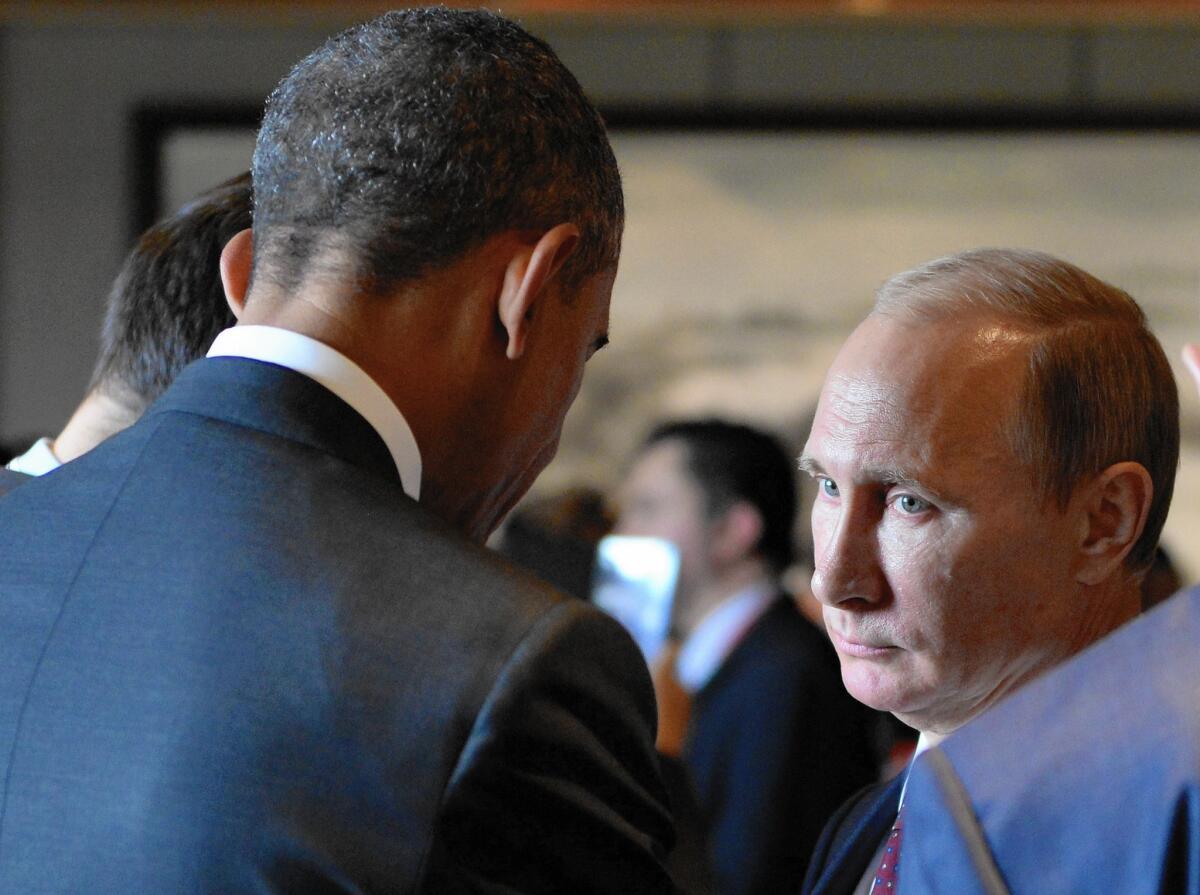U.S. use of sanctions is riling some beyond the target countries

Reporting from WASHINGTON â The Obama administration confronted a long list of security challenges last year, including Islamic State militants in Iraq, an increasingly aggressive Kremlin and longtime adversaries in Iran, North Korea and Syria.
It responded to each with the same tool: financial sanctions.
At a time of war-weariness and tight budgets, U.S. officials look on economic penalties as a low-cost weapon that can build pressure on foreign governments to stop doing things Washington doesnât like. The number of sanctions programs has doubled over the last decade, from 17 to 34, government figures show.
The Treasury Departmentâs sanctions writers âhave opened a new battlefield for the United States, one that enables us to go after those who wish us harm without putting our troops in harmâs way,â Treasury Secretary Jacob J. Lew said last year.
But as the U.S. has used sanctions more, the limits of their effectiveness have become more visible. So too has their potential for causing strain in Americaâs alliances. Even though U.S. officials often try to coordinate sanctions with allies, they have the ability to act on their own when deemed necessary. As a result, some U.S. friends have joined in the complaints by adversaries that sanctions represent a new form of American unilateralism.
The Russians and North Koreans are threatening retaliation. The Chinese have made it clear that over the long term, they will seek to develop new international financial institutions that could limit U.S. power to wield an economic weapon.
And some European leaders have complained that U.S. sanctions directed at opponents, particularly Russia, have begun to cause problems for its friends.
French President Francois Hollande said last week that the Western policy of escalating sanctions on Russia âmust stop now.â
âIâm not for the policy of attaining goals by making things worse,â he said.
Ian Bremmer, a political risk analyst, described the Obama administrationâs use of sanctions as âthe weaponization of finance.â Such measures appeal to policymakers in part because America can do them alone, at a time when assembling coalitions has become increasingly difficult, he said.
âThe U.S. often canât get the Chinese to do what it wants through threats or enticements,â said Bremmer, president of the Eurasia Group risk analysis firm. âBut by using the power of the dollar, it can convince Chinese banks not to do things. And that can bring the result the U.S. wants.â
Although the administration has been aggressive in its use of sanctions, Congress has been even tougher. It has sought to go further than the White House in targeting Iran, Russia, Venezuela and other countries.
Sanctions have punch because of the importance of the U.S. economic system. The United States can dry up trade, investment and financing for adversaries by threatening to freeze their business partners from access to U.S. markets, even if theyâre not American companies.
Federal and state officials were able to fine Franceâs biggest bank, BNP Paribas, $9 billion for sanctions violations last year, for example, because the bank couldnât afford to be cut out of U.S. markets. Such threats have particular force now because the strength of the dollar has made U.S. investments more attractive.
Policymakers are using sanctions because of their track record âand because thereâs an enthusiasm that they can do even more,â said Elizabeth Rosenberg, a former Treasury sanctions official who directs the energy and security program at the Center for a New American Security, a Washington-based policy group.
In recent years, U.S. officials have refined sanctions, shifting from the blunt tool of broad trade embargoes and U.S. aid cutoffs to narrowly tailored penalties aimed at cutting off business with key foreign leaders and the agencies and businesses tied to them. U.S. officials are also more sophisticated at tracking the business dealings of those targeted by sanctions.
The power of sanctions has been clear in the damage inflicted on the economies of Iran and Russia by U.S. and European penalties over the last year.
Officials have âmoved from a sort of undergraduate sanctions approach to a postgraduate, where the sanctions are much more potent,â said Jeffrey Schott of the Peterson Institute for International Economics in Washington, who heads a State Department advisory committee on sanctions.
Yet though sanctions imposed in the last year have shown the power to inflict damage, they havenât proved the ability to force authoritarian leaders to do what America wants.
Sanctions have clearly forced Iran to negotiate with world powers over its disputed nuclear program, for example. But Iranâs supreme leader, Ayatollah Ali Khamenei, has continued to insist, after a decade of talks, that he will not accept the nuclear rollback Western governments are demanding.
Russian President Vladimir Putin has shown no sign that he intends to reverse the annexation of Crimea or ease support for separatists in eastern Ukraine. He may be calculating that if he holds out, Europeans will eventually cut back their sanctions because of the economic pain to companies in their own countries, Schott said.
In the meantime, Americaâs eagerness for sanctions, particularly the moves against Russia, is causing strain with Europe. Restricting business with Russia hurts Europe more than the U.S. because Europe has 10 times more trade with Russia.
Russia and other targets of sanctions have other ways to retaliate, which could damage U.S. interests. Russian officials have threatened to halt cooperation with the U.S. on placing pressure on countries such as Iran and Syria, for example. And U.S. intelligence officials have seen worrisome signs that Russians have been breaching unclassified U.S. computer systems, perhaps in retaliation.
Bremmer says he believes that Russia and North Korea could retaliate against the United States with cyberattacks. The administration this month announced new sanctions against North Korea, which it blames for the cyberattack on Sony Pictures Entertainment.
âPutin believes heâs being singled out for punishment,â Bremmer said. âAnd he has an ability to lash out.â
Twitter: @richtpau
More to Read
Sign up for Essential California
The most important California stories and recommendations in your inbox every morning.
You may occasionally receive promotional content from the Los Angeles Times.











